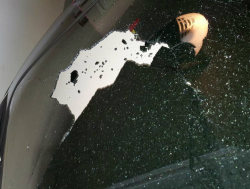
— A Volkswagen exploding sunroof class action lawsuit will continue for California customers after a federal judge refused to dismiss the complaint.
The lawsuit alleges Volkswagen failed to warn consumers about sunroofs that spontaneously shatter due to defects in the sunroofs.
The VW class action lawsuit includes California customers who purchased or leased these vehicles if they were equipped with factory-installed sunroofs:
- 2005-2017 Volkswagen Jetta
- 2015-2017 Volkswagen Golf
- 2006-2015 Volkswagen GTI
- 2009-2010 Volkswagen CC
- 2007-2016 Volkswagen Eos
- 2006-2009 Volkswagen Rabbit
- 2012-2017 Volkswagen Passat
- 2004-2006 Volkswagen Touareg
- 2011-2017 Volkswagen Touareg
- 2008 Volkswagen R32
- 2009-2017 Volkswagen Tiguan
According to the class action lawsuit, owners get stuck paying for sunroof repairs and replacements because the automaker blames incidents of broken glass on outside objects hitting the glass.
The sunroofs allegedly don't need to be hit with outside objects, say the plaintiffs, and the proof is found in the angle of the broken glass which points outward. The lawsuit says this should convince anyone the glass wasn't forced downward such as what would happen if a rock hit the sunroof from the outside.
The plaintiffs claim even when the vehicles are still under warranties, Volkswagen refuses to cover the expenses and throws the cost back onto the customer.
Volkswagen also allegedly didn't meet the engineering levels needed to install safe sunroofs in vehicles and decided to sell the vehicles without being honest with consumers.
According to the lawsuit, VW knew about the dangers of exploding sunroofs because in 2012, the South Korean government's auto safety and testing arm called KATRI opened an investigation into exploding sunroofs.
The probe included multiple manufacturers and VW was allegedly updated about the results which found panoramic sunroofs were prone to shatter.
"At a hearing in November 2013 before Korea's Ministry of Land, Infrastructure, and Transport ("MOLIT"), KATRI presented its findings and allowed automakers to respond. Representatives from VW as well as other manufacturers were present at this meeting."
The judge denied a motion to dismiss implied warranty claims in the first amended lawsuit but did dismiss unjust enrichment claims with prejudice.
Also dismissed were claims concerning unfair competition law, California Consumer Legal Remedies Act and fraud by omission after the judge concluded the lawsuit did not adequately "allege that VW had knowledge of the alleged defect at the time of sale or lease."
However, the judge gave the plaintiffs a chance to amend those claims and file a second amended lawsuit.
The plaintiffs claim Volkswagen must have known about shattering sunroof dangers based on 57 complaints filed with the National Highway Traffic Safety Administration (NHTSA).
But the judge ruled he didn't find that argument persuasive because it's not "an unusually high number of complaints" relative to the "potentially hundreds of thousands or more" affected vehicles.
"Standing alone, the allegations of consumer complaints are therefore insufficient to allege knowledge."
But the plaintiffs also allege the automaker knew the sunroofs could explode because VW recalled Beetles for the problem, although Volkswagen says the recall was issued due to a very specific manufacturing defect for just those models.
The judge ruled that recall, in addition to previous Audi sunroof recalls, is enough to at least allege the automaker may have known about problems with the sunroofs.
The Volkswagen exploding sunroof class action lawsuit was filed in the U.S. District Court for the Northern District of California - Deras, et. al., v. Volkswagen Group of America, Inc.
The plaintiffs are represented by the Law Office of Robert L. Starr, APC, and the Law Office of Stephen M. Harris, APC.




